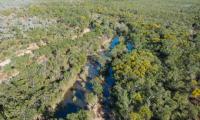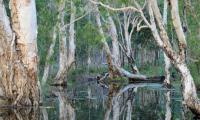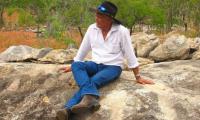Olkola reclaim traditional Cape York land after three-decade struggle
More than 6,300 square kilometres of former cattle grazing land in Queensland is formally handed back to Indigenous owners, spelling the end of uranium exploration in the area and the start of a quest to develop tourism opportunities
One of the largest returns of land to traditional owners in Queensland’s history has killed off the prospect of uranium mining in a key part of Cape York.
The Olkola, who reclaimed more than 6,300 square kilometres of former cattle grazing land in a formal ceremony on Wednesday, are instead seeking business opportunities in adventure tourism.
Just over 1000 sq km of Olkola land is licensed for uranium exploration by French corporation Areva, which has spoken of north Queensland’s potential to match Kazakhstan as a source for nuclear fuel.
But the deal negotiated by the Olkola has forced Areva to give up its exploration licences in areas given over to a national park, and the clan has no intention of allowing mining elsewhere.
The traditional owners are instead in talks with a global adventure travel agency about a possible joint venture.
It comes just months after the Newman government began to accept uranium mining applications across the state with a view to ending a 25-year ban.
The Australian Conservation Foundation has praised the Olkola people’s move, along with their decision to give over almost a third of their land to a protected national park.
For Mike Ross, the chairman of the Olkola Aboriginal Corporation, the joy of reclaiming country after nearly 30 years of negotiations was tempered by the need to find viable ways for his people to make a living.
“Getting the land back is one thing, and now I personally see the challenge for the Olkola people [is] where do we go looking for support,” he said.
“We have to look at the challenge of what are the enterprises that we can introduce into this country.
“My belief and my wishes are that the Olkola will be self sufficient,” he said. “They can control the area, they can manage it and earn their own money, so we can be part of the mainstream that people talk about.”
That is part of what Ross called “chasing the rainbow for my people”, a clan now of about 500 people, driven from their land more than a century ago by white cattle farmers.
It was the Olkala who stayed behind and worked for the graziers – and earned little more than tobacco and blankets – that kept the only link to the old ways and ancestors, Ross said.
One senior Olkola woman, Elaine Price, said the cattle industry stood to become a key earner for the group. “The cattle industry is one we are really trying to get together. The young people love it,” she said.
But the Olkola have also been in discussions with Intrepid Travel, a Melbourne-based agency with more than 1,000 staff worldwide that sells “real life experience” tours to customers in Australia and overseas.
Intrepid Travel’s co-founder Geoff Manchester, speaking at the handover ceremony in Cape York, said it was “fantastic that [the Olkola] understand how important tourism can be and that it has that ultimate long-term sustainability that can go on and on”.
“If they’re looking at not renewing mining leases, I think that makes it more important that things like sustainable tourism are there to offer employment to their people and to develop and use the area,” he said.
“It was really exciting that they wanted Intrepid in particular to come and work with them and I think we can offer them assistance with the types of things that our sorts of travellers would like to do.”
Intrepid is linked to a non-profit foundation that has backed conservation over mining projects in other parts of Australia.
Manchester said opportunities to see life firsthand in Cape York with the Olkola, whose recently discovered cave paintings were among “the best in the country”, would greatly appeal to travellers looking beyond standard package tours.
“People who’ve travelled so much these days are attracted to seeing the Great Wall of China or the Sydney opera house but what they really love is having experiences with local people and learning about local people’s lives, whether it’s here in Cape York or in India or in Egypt,” he said.
“It’s about going and living with local people, learning about how they live, what it is they do on their land, what their cultural and religious ceremonies are, what they want to get out of their lives. That’s what people really enjoy and come back to more and more.
“I think in this Olkola area, the Aboriginal tradition is so long and so strong that people would just love to come along and experience that.”




More climate news
Conservation council highlights opposition to Yeelirrie uranium mine bid
The West Australian Conservation Council says traditional owners and locals in the
northern Goldfields oppose Canadian giant Cameco's application to mine
uranium.
Thousands of marchers demand just solution at UN climate talks in Lima
$200 million Australian contribution to UN Green Climate Fund
.....but it will come out of the foreign aid budget
Australia talks tough on climate in Lima
Australia urges China, India to do more on climate
Decarbonisation push emerges at UN climate talks
Still time to limit global warming, UN chief Ban Ki-moon says